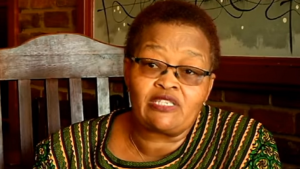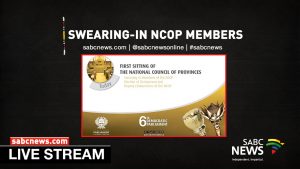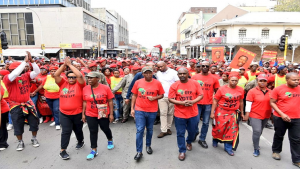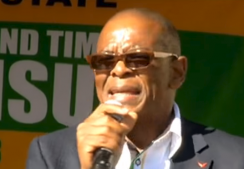As politicians step up their campaigns ahead of the 8 May elections, outspoken musician, author and activist Sizwe Mpofu-Walsh seems to have found a way to reach out to South Africa’s youth and encourage their participation in the country’s democracy, by offering election coverage with a twist. The #SMWX Election Newsletter promises subscribers the ‘Sizwe Mpofu-Walsh Xperience’ while they keep abreast of the latest election news. Better yet, it promises this on a platform that is accessible, personal, affordable and already an essential communication tool that many South Africans rely on – WhatsApp.
Technological advancements impact every aspect of life, so it’s no surprise that emerging technologies have a role ahead of South Africa’s upcoming national elections – shaping voter opinion and voter engagement. A new channel on an established platform aims to elevate the voices of SA’s youth, including voices often excluded from mainstream media endeavours.
Sizwe Mpofu-Walsh believes the youth vote is a vote of power, maintaining that South African youth are not as apathetic as the older generations would believe. Teaming up with techno-firm Thanga, the WhatsApp newsletter is a dynamic way to interact with election information, making use of the best of emerging technologies – instant messaging, chatbots, artificial intelligence, user interaction – while still ensuring human interaction and analysis where it matters.
About #SMWX Elections Newsletter
The #SMWX Election Newsletter officially launched on 11 March 2019, just one day after the thirty-year old announced its existence on Twitter – with less than two months before South Africans are set to take to the polls.
Mpofu-Walsh says his aim is to stimulate debate and grow interest in active citizenry – not, as many believe, to drive a political agenda.
The WhatsApp channel uses prompts to allow users access to various available options, from the latest video episodes (#Episodes), election music videos (#Music) and news (#News), to viewing upcoming guests (#Guests), behind-the-scenes footage and photos (#Backstage) or to provide feedback on posted content (#Feedback). Each selection gives subscribers access to a new prompt menu and different types of content.
Within one day of launching, before the first video episode was released, the channel had grown to over 6000 subscribers. The first episode, a live stream with Mpofu-Walsh that allowed subscribers to interact with him and ask questions about the broadcasts, elections and, of course, his motivations, saw the channel gain another 1000 subscribers.
The overall theme seems to be change – change in technology, change in engagement and, of course, change in the country with the tagline ‘#OutWithTheOld, #InWithTheNew’.
Part of this theme is to create space for younger commentators, activists, politicians and personalities to engage with South Africa’s younger audience – shifting away from traditional, mainstream election coverage.
During the first episode Mpofu-Walsh defended this goal and explained his motives for starting the channel amidst accusations that it could be a campaigning tool for a political party. He vehemently denied these accusations.
“This is not funded by any political party, this is not the project of any party. And we will be unapologetic about getting a youth perspective from everybody,” he told viewers.
He also reassured his subscribers that his father, Dali Mpofu, who is national chairperson of the Economic Freedom Fighters (EFF), would not influence or sway his election coverage.
Guests
Mpofu-Walsh’s first guest hails from the same political grouping as his father. Twenty-six year old Naledi Chirwa, who appears on the Economic Freedom Fighters’ (EFF) list of candidates destined for parliament, is an outspoken activist and no stranger to the limelight. As a student she was arrested for leading #FeesMustFall protests on campus. She was also one of four women who staged a silent protest during then-President Jacob Zuma’s speech at the IEC-results centre shortly after the 2016 local government elections. The women, clad in black, stood in front of the podium holding signs that read ‘Remember Khwezi’ and ‘I am 1 in 3’ – a reference to the late Fezekile Kuzwayo who accused Zuma of rape in 2005. At the time, he was deputy president of a country where one in three women experience sexual violence in their lifetime.
The guest for the second episode was South African comedian and TV personality Nina Hastie. Hastie is outspoken about her support for the ANC and was photographed at a gala dinner ahead of the ANC’s 107th birthday celebration, wearing a nametag labeling her ‘Social Influencer’. This sparked widespread allegations that the ruling party was paying influential social media users to campaign to their followers on the party’s behalf.
The first two shows seem to balance voices from both the ANC and EFF camps – while highlighting strategies the parties plan to use to win over the youth. While the EFF has student leaders like Chirwa as part of their arsenal, the ANC also announced in 2018 that former-Wits SRC member and #FeesMustFall leader Fasiah Hassan would be joining the party’s media team ahead of the elections. Hassan has been internationally recognised for her role in the struggle for free higher education and currently holds the position of deputy president of the South African Union of Students.
Besides broadcasting interviews with prominent activists and political role players, the #SMWX Channel has also added a #Newsbytes function which promises to keep subscribers up to date with all the latest election news.
AI and indigenous languages
The channel does more than make use of an instant messaging platform to connect to younger audiences – it also relies heavily on artificial intelligence (AI) technologies, using a chatbot to take users through different prompts, giving near-instant replies.
The first chatbot, ELIZA, was introduced to the world in 1966 by Joseph Weizenbaum and simulated basic human interaction – using just 200 lines of published code. By the mid-2000s many companies had chatbots interacting in areas like sales, client service and information. Only in recent years, however, have news organisations started exploring chatbots to offer personalised experiences and content interaction for their audiences.
Mpofu-Walsh partnered with local AI studio Thanga, run by South African technopreneurs Roy Mathieu Borole and Ryan Dick. Their expertise lie in developing AI tools to help brands discover new opportunities. And so far, they have not disappointed.
The biggest surprise – an announcement from the #SMWX channel that the service would now also be available in Xhosa, just four days after the English channel launched. Future plans include rolling the channel out to include all 11 official languages.
This is a breath of fresh air as discussions surrounding AI technologies often highlight the fact that the majority of tech development is focused on the North American and European markets, while emerging markets like Africa are all but ignored.
Sunday Times columnist Yolisa Mkele wrote about the challenges of AI and smart assistants from an African perspective, saying that many smart assistants do not recognise South Africa’s vernacular languages and struggle with understanding local accents.
“If you’re not some type of European then you can more or less forget trying to communicate with your smart assistant in your mother tongue,” Mkele wrote, pondering in his column whether AI would eventually lead to the death of indigenous African languages.
But Africa is not the only continent affected by this ‘AI bias’ – Asian consumers face the same challenges. In India, the Language Technologies Research Center works to address this by curating a speech database of the Indian subcontinent’s languages. This, they hope, will assist AI developers and AI systems to process the region’s natural languages and speech patterns for both verbal and text communication.

Engaging younger audiences on elections
Despite a number of prominent youth-led social and political movements making headlines in recent years, young people are often portrayed as socially and politically apathetic, both locally and internationally. The Independent Electoral Committee has expressed concern that fewer young South Africans have registered as first time voters in the upcoming elections. Of the approximately 9,9 millions South Africans who are eligible to vote but not registered, 6 million are under the age of 30.
If the aim is to make election coverage more exciting for the youth, then Mpofu-Walsh might just have found the right platform. The bulk of South Africa’s social media users are between the ages of 18 and 34 years, with men making up 31% and women 29%. According to a GlobalWebIndex survey around 90% of internet users in South Africa also make use of Whatsapp. – Fray News






